Schlagwort: ‘Mechanical Engineering’
Getting to know a different culture
- Mechanical Engineering B.Sc.
- France, Signy L’Abbaye
- Beuret Sarl
- 09/22 – 12/22
My internship in France
The company I worked for produces agricultural equipment and steel structures for buildings. Since the company moved to a new location recently, they needed new custom equipment like tool cart for storing and moving heavy tools. I spent the majority of my time developing, designing in the office and manufacturing this equipment in the factory. Having the responsibility for those projects and completing them was a truly rewarding experience.
Even though I did not work on the division of the company that was responsible for the buildings they let me go on the respective construction sites a few times during my stay. Although this was not at all part of my internship, I still enjoyed discovering the big machines and assembly techniques they used to join the massive components that were previously prepared in the factory.
Working in a small company (about 10 persons in total) helped me to get to know all the people very quickly. I had a great relationship with both the employees and the supervisors from the beginning on which made my time in the company really enjoyable.
I worked a total of 40 hours a week which is not necessarily typical in France. Many people only work 35 hours. This makes room for other activities after work. Also, the meals have a much greater importance than in other European countries. Lots of companies have 60 to 90-minute lunch breaks and it is common for grocery stores and other shops to close during midday. But many stores make up for this by opening their doors on Sunday morning.
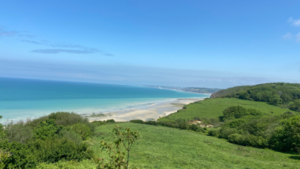
© Dimitri Robert
Luckily, on Fridays I only worked till 12 pm which made it possible to plan longer activities for the weekend. I tried to discover as much as possible of the “Champagne” region. It’s especially known for its production of champagne and its vineyards.
On another occasion I had the opportunity to travel to the beaches of the Normandy and admire the breath-taking landscape. These places are not only beautiful but also have an undeniably interesting historic relevance.
Travelling to these different destinations by train is difficult and takes a lot of time. In addition, the company I worked for was situated in a very rural area. So, having a car was a necessity in this region of the country.
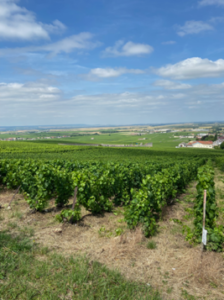
© Dimitri Robert
Something you need to get used to when you live in France are long and late dinners. Most of the time, they start with the well-known “apéro” where you have a few drinks and snacks before beginning to eat your meal. I really enjoyed those convivial evenings. I also observed that drinking wine at dinner was a lot more common than in Germany. Even a lot of young people enjoy drinking a glass of wine instead of beer. In general, the locals are proud of their local wine and especially champagne.
Helpful information
Good news is my phone worked without any issue thanks to EU-Roaming. On the other hand, German mobile network operators have put in place a limit of months that you can spend abroad. Exceeding this time limit will result in them charging you extra roaming fees. Luckily, many French carriers provide very generous offers for the first year of contract. Combined with a pricing that is generally much lower than in Germany, getting a mobile plan with a lot or even unlimited data becomes very affordable. Your mobile plan can even replace Wi-Fi. So, if you plan on staying more than a few months in France, I would definitely recommend getting a French mobile plan.
Same thing goes for your bank account and credit card. You should check with your bank if the card you plan on using works abroad. Opening a bank account was not necessary for me but it made withdrawing money free of charge and receiving my salary was also easier this way.
Keeping in mind that finding a fitting internship and going through the application process would take a bit longer than in my home country, I started to plan my stay more than 6 months ahead. This gave me enough time to prepare everything properly and I would recommend this to anyone who wants to go abroad. All in all, my internship abroad was a great experience for me. Getting to know a different culture and improving my language skills while completing a mandatory part of my curriculum was amazing and I would recommend it to anyone who has the opportunity to do so.
My internship in Bilbao
- Business Administration and Engineering M.Sc. Mechanical Engineering
- Spain, Bilbao
- FEV Iberia SI
- 10.10.2022-15.01.2023
Preparation:
When it comes to preparing for a stay in Bilbao, the most important thing is housing. In general, finding a place to live in Bilbao is not as stressful as in other cities. The best place to look for housing is “idealista”, a Spanish online real-estate marketplace. Prices obviously differ, but finding adequate housing for around 500 Euro/month is possible. Especially, when you can communicate in Spanish and also stay for at least half a year. Also, there are Erasmus Telegram and Whatsapp groups (you can find them on Instagram or in the Internet) where rooms are offered as well. Besides to look for housing, this is also a great way to make first contacts in the city. Another important preparation would be to look for health insurance. I had the luck that it was organized by the company.
Finding an internship:
In my case, I was a working student in the Aachen Office of the company I then worked for in Bilbao. Generally, going for an international company is the easiest way to find an internship abroad and that’s also how most people I talked to did it. Especially, when you are not fluent in Spanish, a regular local company will be tough to convince to take you.
Culture:
Most people have been to parts of Spain before, so I guess a Culture shock is not to be expected in
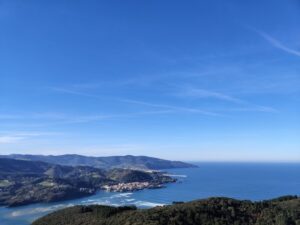
© Lukas Tacke Genannt Unterberg
that case. However, Bilbao is part of the former Basque-county. Even if it is technically Spain, the people are often quite proud of their heritage. Some might take it as an insult, if you call them Spaniards. Additionally, the Basque language is very prominent. You will hear it on the streets and read it a lot on signs. It is very different from Spanish, so don’t be fooled thinking it is just some form of dialect you might be able to understand! All in all I must say, people were very welcoming and most of the time happy to help and communicate, even if there isn’t actually a common language between you. The level of English capabilities is very low in that area, so basics in Spanish or Basque can be very helpful.
Day to day life:
Coming from the culture, food plays a very significant role there. Pintxos (A slice of bread with ANY savory toping you can think of) might be the most prominent one. You can take them for lunch or in the evening with some drinks. Since the city is next to the ocean, fish and other seafoods are integrated in a lot of dishes. If you are a vegetarian or a vegan, it might be hard for you. In more traditional restaurants the vegetarian dish is just a salad or something along that line, so you might want to go to more modern places.
When it comes to going out in the night, Bilbao has a lot to offer. Especially in the casco Viejo (old town) the bar density is very high. But also throughout other parts of the city, you will always find a nice place to grab a beer or a Kalimotxo (popular Basque drink, red wine with cola) and some Pintxos. The club landscape is definitely more restricted. For most clubs, you have to love reggeaton, since it will be played the whole night. But there are also some clubs, where the music choices are more diverse (strong recommend for “Sala Sonora” for Saturdays).
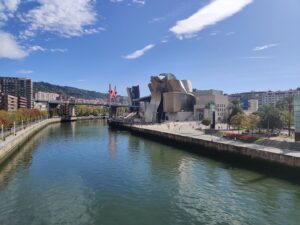
© Lukas Tacke Genannt Unterberg
Public transport is ridiculously cheap and easy in Bilbao. You go to any bigger metro station and buy a “Barik Card”, on which you then can load money. From then on, you just touch-and-go for trains, buses and the metro for prices mostly below 50 cents per ride. The metro also goes all the way to the ocean. Plentzia and Sopella are the beaches reachable by metro I recommend the most. If you want to explore the area, for hikes or to visit other towns nearby, going by bus (Asta or bizkaibus) is a very good option. Most beautiful places I have seen are: San Sebastian, Gangekogorta and the Urdaibai area.
When it comes to work life, in my case it was very similar to my experiences in German companies. Similar working hours, with maybe a longer lunch break and in my case an amazing office climate. My co-workers were always happy to help with tasks or problems at work, but also with recommendations what to do in the area on weekends or which restaurant to go to.
My stay in Vienna – a truly transformative experience
- Business Administration and Engineering: Mechanical Engineering B.Sc.
- Austria, Vienna
- Austrian Institute of Technology
- 09/22 – 12/22
My name is Eva, and I spent September till December 2022 in Vienna doing an internship at a non-university research Institution, in the area of energy technology.
My half year Erasmus experience in Vienna was an incredible journey that completely exceeded my expectations. I arrived in the city in September, feeling a mix of excitement and nervousness. I didn’t know anyone in Vienna, and I was worried about how I would make friends and adjust to living in a new country. But from the moment I arrived, I was pleasantly surprised by how welcoming and friendly everyone was. I really fell in love with the beautiful city of Vienna. To be honest, I was obsessed to do my internship in this city. I have never been there before, but my sister who is currently living in Zurich (I am a bit of a fan of this city as well) told me it is almost as beautiful and a lot cheaper. Spoiler: it is definitely more livable as a student because you can actually afford activities. The cost of living is not as cheap as in Aachen, but still within the range of big cities like Munich or Hamburg.
One of the first things I noticed about Vienna was its stunning architecture. The city is filled with gorgeous buildings and landmarks. I spent many afternoons wandering the streets, taking in the sights and soaking up the rich culture of the city.
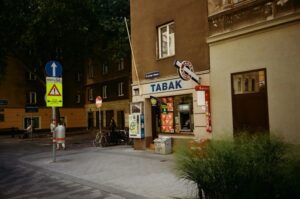
© Eva Paeffgen
In Vienna there are no kiosks, so everywhere are little “Trafiks“ which look really cute. If you want to get a beer in the evening, it is difficult, because supermarkets are closing at 8 pm. But you always can get one at a Würstelstand. My favorite one is the `Wiener Würstelstand´ in Pfeilgasse crossing Strozzigasse. I can recommend the vegan bosna. On the weekend they do organize little events with pretty cool live music.
I was really lucky! In my office I sat only with interns, bachelors students, masters students and PhD students. So it did not take long till we went on for a beer or other activities. My colleagues and I went bouldern. The company were paying half of the price to support sport activities. We also went for paddle, weird sport.
It was also really affordable to do some yoga, in the “oneYoga“ studio it is possible to test all classes for 30 euro for one month after that it costs 90 euro what’s still okay if you go three times a week.
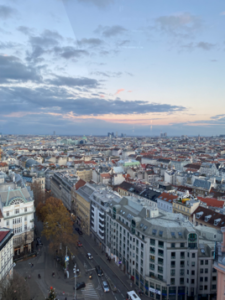
© Eva Paeffgen
I was living in a shared flat with another girl, I found the place on WG-gesucht. It is not easy to find something, but that’s only because no flats are rented with furniture. Everyone else I have met said if you are staying longer, the market really is alright because of social housing. Our flat was in the 8th Bezirk Josefstadt, I would recommend living in the area. It took me 35 minutes to work by train but only a 10 minute walk to get in the city or in the 7th Bezirk which is absolutely my favorite. Full of little restaurants, cute boutiques and nice bars. Maybe a few recommendations: Bars: Espressobar, Cafe Anno, Cafe Benno (they have a lot of games, and you can eat really good kasespätze there). Breakfast: Cafe der Provinz, all you can eat for 18 euro, with a good quality of food, most of them vegetarian and a lot of vegan stuff. Party: there is a website called Vienna wurstelstand -making the most out of Vienna and life. Every month they make recommendations about cool events. My friends and I did a lot of it. Went to art galleries, little concerts or parties. It is also nice to get to know Vienna, so take a look. Restaurants: pizza bussi ciao, mamamon thai or nguyens pho haus.
The picture on the left was taken from the top of the “Haus des Meeres“, you can get up there for free, but it is also possible to have a drink or eat something there. I would go up for the view and get a beer in the area, there are a lot of little cute bars around.
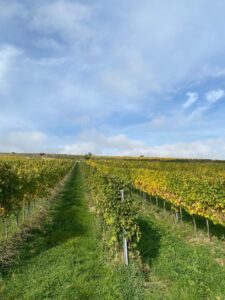
© Eva Paeffgen
If you are also going in winter, you should take a walk on the Kalenberg, it is not far from the city and for me, it was really important sometimes to get some nature and fresh air between all these massive and impressive buildings. There are a lot of Heurigen (vine farmers that are selling between their fields) you can drink „Sturm“ and with good weather you get a beautiful view over the city.
I also had the chance to travel on the weekends. I went to Bratislava which is worth a visit, it is only two hours by train and the city has much to offer. Budapest is a four hour trip, in my opinion you have to stay overnight to make it worthwhile.
Last thing: withdrawing money costs fees, but you can get it for free from the supermarkets.
Overall, my half year Erasmus experience in Vienna was a truly transformative experience. I grew as a person and learned so much about myself and the world around me. I am so grateful for the opportunity to do my internship abroad and to have had the chance to live in such a beautiful and culturally rich city. I will always treasure the memories I made in Vienna and I hope to visit again someday.

